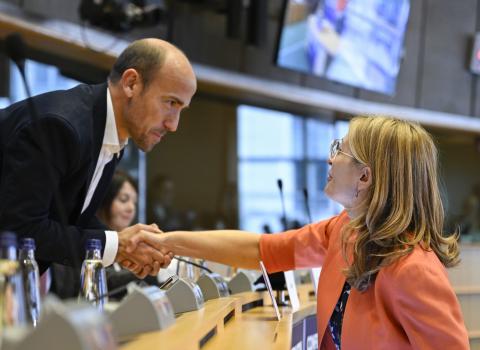As plans to include research and innovation in a new EU Competitiveness Fund firm up, attention is shifting to the legislative process

Stéphane Séjourné, executive vice-president for prosperity and industrial strategy, speaking at an event on European competitiveness organised by the European Commission. Photo credits: Lukasz Kobus / European Union
Signals that the next Framework Programme will be placed in a new Competitiveness Fund are growing, with European Commission vice president Stéphane Séjourné stating this week that the fund would be a “coherent architecture that follows the entire life of companies from research to industrial production.”
Meanwhile, a leaked structure for the fund featured some, but not all, elements of Horizon Europe and made no mention of a separate FP10.
But signs that the Commission will struggle to get such a proposal past its co-legislators are also growing.
As European People’s Party MEP Christian Ehler recalled in a social media post, both the European Parliament and the Council of the EU have rejected the idea of restructuring EU research spending in an umbrella fund.
“Ignoring the co-legislators in preparation of legislation doesn’t uphold the institutional balance of the Union: the executive must respect the Parliament,” he wrote.
Kurt Deketelaere, secretary general of the League of European Research Universities, explained that the Council and the Parliament could amend the Commission’s proposal before agreeing on the final legislative framework for the programme, either immediately or through a conciliation procedure. “The Commission can help and advise behind the screen but has lost control once the proposal is there,” he added.
Related articles
- Brussels rumour mill churns out new scenario for FP10
- Viewpoint: Europe’s research community needs more clarity (and respect)
This will not be news to the executive, of course.
“Could the Commission attempt to shape its proposal in a way that makes it politically more difficult to reject, for instance by bundling it with broader economic or strategic priorities, or by presenting it under a different label? Possibly,” said Tadas Tumėnas, head of the Lithuanian Research Development and Innovation Liaison Office in Brussels.
“But substance ultimately matters more than form, and both co-legislators will examine the content and implications of any such proposal,” he added.
Mattias Björnmalm, secretary general of the CESAER university association, also said that the substance of the proposal would be more important than how FP10 was framed.
“If the surrounding environment is unstable, it undermines researchers’ and innovators’ ability to pursue bold and impactful ideas,” he explained. “Whatever proposal the Commission puts forward, it must prioritise clarity, stability and predictability in the funding, conditions and processes for researchers and innovators. Labels are less important.”





 A unique international forum for public research organisations and companies to connect their external engagement with strategic interests around their R&D system.
A unique international forum for public research organisations and companies to connect their external engagement with strategic interests around their R&D system.